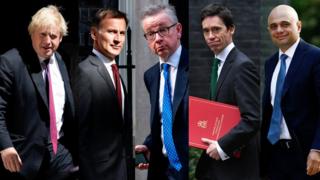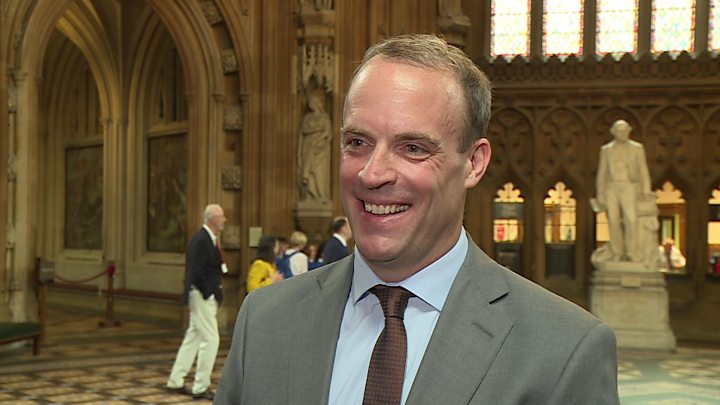Tory leadership race: Candidates await third vote result

Tory MPs have voted in another round of the leadership contest, with the man who comes last set to be eliminated.
Results of the secret ballot are expected soon after 18:00 BST and surviving candidates will face further votes until only two are left.
Conservative Party members will then be able to vote on the final two, with the winner becoming party leader and PM.
Dominic Raab, who was knocked out on Tuesday, has backed leadership frontrunner Boris Johnson.
Hours before the third ballot opened, Rory Stewart said he was in talks with his rival Michael Gove about “combining forces”.
Sources close to Mr Stewart said: “Clearly at some time people will need to combine teams. But any team that gets combined, Rory wants to lead.”
However, the environment secretary’s team rejected the idea he would run a joint ticket with Mr Stewart at the top.
The BBC’s Laura Kuenssberg says it isn’t clear what incentive the other candidates would have to drop out in favour of Rory Stewart, who came fourth in the second round of voting on Tuesday.
Speaking to the BBC’s Victoria Derbyshire programme, Mr Stewart said he was in talks with Mr Gove “because it’s clear that Boris is going into the last round”.
“And the question is ‘who is best placed to sit on stage with Boris Johnson, and who is best placed to ask the testing questions that need to be asked?”‘ he said.
The two men have argued for different approaches to Brexit – Michael Gove wants to negotiate a new deal with the EU, whereas Rory Stewart says this is unrealistic and wants to stick with the current deal, but find a new way to get it through Parliament.
- Brexit: Where do Conservative leadership candidates stand?
- Fact-checking the Tory leadership candidates’ claims
When asked how they could compromise, Mr Stewart said: “If neither of us were prepared to budge on our analysis then we couldn’t combine as a team.”
Boris Johnson’s campaign received a boost, gaining support from former Brexit Secretary Mr Raab.

Media playback is unsupported on your device
He said Mr Johnson was “the most credible to get us out of the EU by the end of October” and was “absolutely committed” to meeting that deadline.
“Above all he’s got the optimism. This country needs to feel good about itself and I think he’s the man to deliver that,” he added.
A number of Mr Raab’s supporters have also switched to Mr Johnson – including ex-Brexit Secretary David Davis, Nadhim Zahawi and Anne Marie Morris.
On the firmness of his commitment to an October departure, Ms Marie Morris said: “He recognises he’s got to appeal to a very broad range of individual MPs and the vast majority are Remainers, so he’s trying to leave himself some wriggle room.
“But the mathematics are such that if we don’t get out on the 31 October, frankly, the party is history.”
Mr Johnson led the second vote securing 126 votes, ahead of Jeremy Hunt, Mr Gove, Mr Stewart, Sajid Javid and Dominic Raab.
Despite only just gaining the minimum number of votes yesterday to stay on the ballot paper, Home Secretary Mr Javid has said he is not planning to stand down from the leadership contest.
When asked if he was going to withdraw he said: “I was really pleased to get through yesterday and I’m looking forward to the challenges that lie ahead and making my case.”
Arriving to vote on Wednesday, he said he was “quietly confident” and when questioned where he expected to have won votes from, he said he would “explain afterwards when I’ve won”.
Speaking earlier on Radio 4’s Today programme, Mr Stewart said he had received “some positive responses” from those who had previously supported Mr Raab.
The five remaining candidates faced questions from the public on Tuesday evening, in a live debate on the BBC.
Tory candidates’ Brexit plans in 50 words
The Conservative leadership candidates all know that solving the Brexit conundrum is their number one task.
But how do they propose to do it? And if they can’t, what are their contingency plans?
BBC political editor Laura Kuenssberg asked the remaining hopefuls to outline their proposals.
The catch? They had to answer in 50 words or less.
During the TV debate, Mr Javid appeared to secure a commitment from the other candidates that they would approve an independent inquiry into Islamophobia.
However, there was less agreement on whether and how the UK could leave the EU by 31 October.
Ex-Foreign Secretary Mr Johnson said it would be “eminently feasible” but avoided offering an absolute guarantee.
Mr Gove and Mr Hunt said extra time might be needed. Mr Stewart said he would try to push through Theresa May’s Brexit deal which has already been rejected by MPs three times.
Only Mr Javid committed firmly to 31 October.
Media playback is unsupported on your device
The debate was presented by Emily Maitlis who told the Today programme it was “a very bizarre thing to prepare for” because until 90 minutes before it started it was not clear who would be there because of the MPs’ ballot.
She also said the candidates had, before the debate started, “all decided what boy band they were going to be” – a reference to the style and set up of the chairs.




